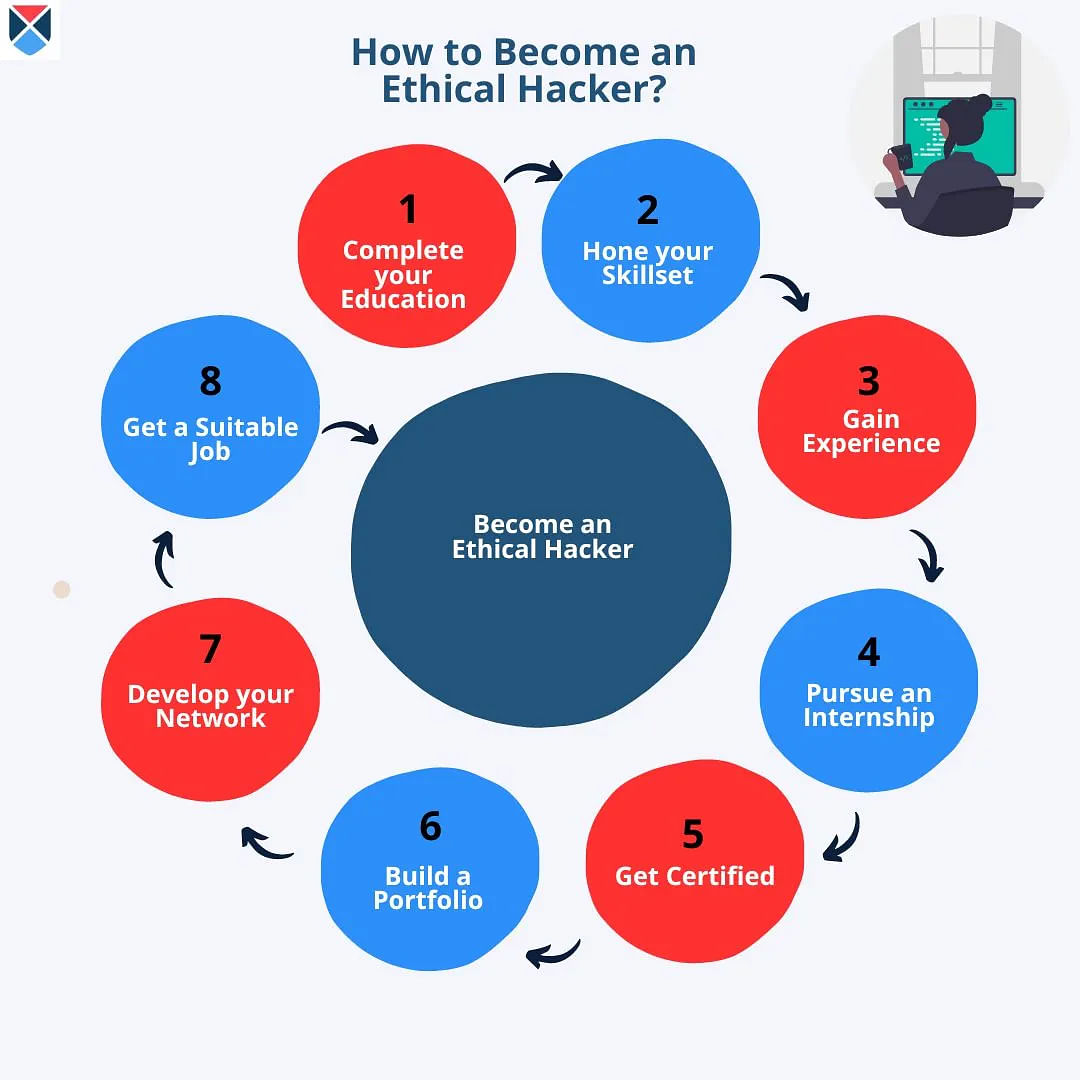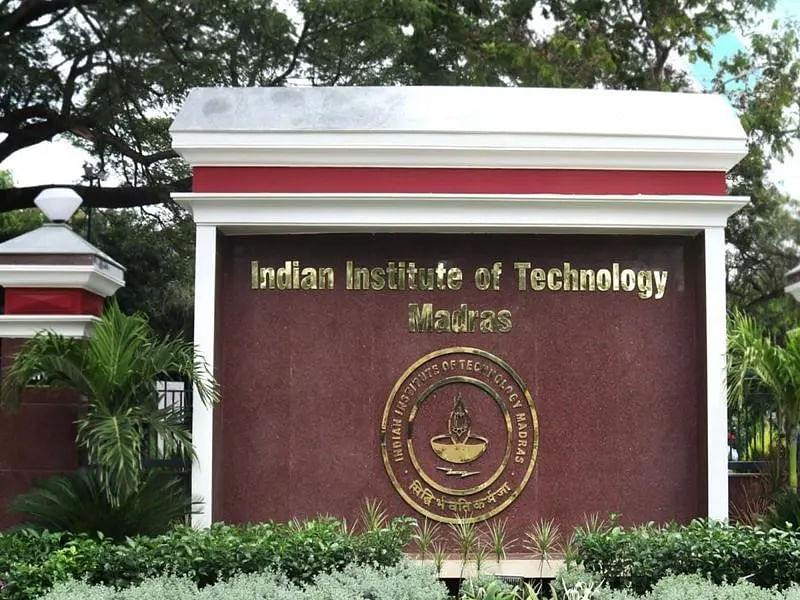Is being a Ethical Hacker your dream career option? Check out the complete step by step process on how to become a Ethical Hacker, Eligibility, Exams, Skills Required and Salary in 2023.
An ethical hacker is a trained expert who checks an organisation’s overall security by detecting vulnerabilities in computer systems. They utilise their ethical hacking skills to protect the data from malicious hackers or cyber-attacks. In the first quarter of 2023, India witnessed a rise in weekly cyber attacks by 18% compared to the same period in 2022. Therefore, there is a high demand for ethical hackers in India. Moreover, the average ethical hacker salary per month is INR 44,594.
One of the basic requirements to become an ethical hacker is to complete a bachelor’s degree in computer science. Additionally, knowledge of various programming languages, networks, computer systems, security practices, and ethical hacking tools is a must to pursue a career as an ethical hacker in India. Further, candidates can earn relevant ethical hacking certifications and gain experience through internships.
Table of Contents
- How to Become an Ethical Hacker in India?
- Who is an Ethical Hacker?
- What does an Ethical Hacker do?
- Types of Hackers in Ethical Hacking
- Ethical Hacker Salary in India
- Top Companies Recruiting Ethical Hackers in India
- Advantages and Disadvantages of Being an Ethical Hacker
How to Become an Ethical Hacker in India?
An aspirant might take anywhere between 18 months to 6 years to acquire the skills required to be an ethical hacker. It also depends on various other factors like the choice of course, experience gained, etc. In order to understand how to be an ethical hacker, candidates should look into the step-by-step process given below.
- Step 1: Complete Academic Qualifications
- Step 2: Hone your Skillset
- Step 3: Gain Practical Exposure
- Step 4: Pursue an Internship
- Step 5: Get Certified
- Step 6: Build an Impactful Portfolio
- Step 7: Expand your Professional Network
- Step 8: Seek Employment Opportunities
Step 1: Complete Academic Qualifications
At the school level, it is required that the aspirants finish their 10+2 in the science stream. Moreover, the basic ethical hacker degree requirement is to pursue a bachelor’s program in computer science or related fields. Moreover, it is required to pass entrance exams like JEE Main, JEE Advanced, WBJEE, VITEEE, KEAM, BITSAT, etc., to secure admission. Candidates can check the best ethical hacking courses after 12th in the table below.
|
Course Name |
Duration (in years) |
Average Course Fees (INR) |
|
BTech in Cyber Security |
4 years |
INR 3,00,000-10,00,000 |
|
BSc in Networking |
3 years |
INR 60,000-3,00,000 |
|
BSc in Cyber Security |
3 years |
INR 1,50,000-10,00,000 |
|
BTech CSE (Cyber Security & Forensics) |
4 years |
INR 3,00,000-8,00,000 |
|
BTech CSE (Cyber Security & Threat Intelligence) |
4 years |
INR 2,50,000-8,00,000 |
Aspirants who wish to delve deeper and gain advanced knowledge in the ethical hacking field can opt for master’s programs. They need to crack entrance exams like GATE, UPSEE, OJEE, TANCET, etc., to get admission to top institutes. Check out the top master’s degree courses to become an ethical hacker:
|
Course Name |
Duration (in years) |
Average Course Fees (INR) |
|
MTech in Information Security |
2 years |
INR 50,000-4,00,000 |
|
MSc in Cyber Security |
2 years |
INR 30,000-2,00,000 |
|
MSc in Cyber Security & Digital Forensics |
2 years |
INR 30,000-2,00,000 |
|
MTech in Network & Information Security |
2 years |
INR 50,000-4,00,000 |
|
MTech CSE (Information Security and Computer Forensics) |
2 years |
INR 50,000-4,00,000 |
Step 2: Hone your Skillset
Pursuing ethical hacker education is beneficial for gaining fundamental knowledge. However, an aspirant must possess a certain skill set and proficiency in using various tools to begin their ethical hacker career in India. Here are the skills required to become an ethical hacker:
Technical Skills
To excel in their ethical hacking career, it is a must for candidates to have the following technical skills:
- Programming skills: Knowledge of programming languages like Python, SQL, C++, JavaScript, PHO, Ruby, and Perl.
- Networking skills: Understanding of different networking concepts like routing protocols, IP addresses, and DNS servers.
- Linux skills: Candidates must be well-versed in using Linux, which is an operating system that is extensively used for ethical hacking.
- Cryptography skills: Cryptography involves encryption and decryption of data. Ethical hackers utilise this skill to protect the information from being accessed by malicious hackers.
- Web Applications: Ethical hackers should have complete knowledge of how web applications work & the ways to identify & exploit vulnerabilities.
- Database skills: Familiarity with database frameworks and know-how of database management tools.
- Advanced search engines: Knowledge of how search engines work is essential to perform ethical hacking activities effectively.
- Operating System: As an ethical hacker, a candidate must be proficient in using different operating systems, like Windows, Mac, Linux, Ubuntu, etc., to detect and thwart security breaches.
Soft Skills
Here are the soft skills that a candidate must gain to be a successful ethical hacker:
- Critical thinking skills: Ethical hackers need to think critically to be able to inspect computer systems and avert cyberattacks.
- Problem-solving skills: An ethical hacker is expected to come up with creative solutions for challenging problems.
- Communication skills: Effective communication skills help ethical hackers communicate their findings clearly.
- Creativity: It is required to think out of the box and come up with unique solutions as an ethical hacker.
- Organisational skills: Proper planning is required to carry out ethical hacking operations, and hence ethical hackers are well-organised.
Ethical hackers are also skilled in using various tools and technologies. Having knowledge of ethical hacking tools is extremely important in order to identify weaknesses in computer systems and handle security issues. Here are the best ethical hacking tools for the candidate’s reference.
- Nmap: Network Mapper is used to collect data about a target system, inspect device security, and determine the weaknesses inside a network.
- Wireshark: It is open-source software that helps ethical hackers investigate real-time network traffic.
- Metasploit: A pen-testing framework that consists of a set of tools to check system vulnerabilities, carry out remote attacks, etc.
- Acunetix: It scans web applications by detecting exploitable vulnerabilities like cross-site scripting, SQL injection, etc.
- Nikto: Ethical hackers use this security tool to audit web servers and conduct various tests against the given remote host.
- SQLninja: This tool is helpful in targeting and exploiting web applications that utilise MS SQL server as their backend database server.
- Canvas: A security tool that is useful in downloading passwords, altering files inside the system, and exploiting remote networks.
- John the Ripper: This is the best ethical hacking tool for cracking passwords. It can also be used to evaluate the password strength of an operating system.
Step 3: Gain Practical Exposure
Along with completing the qualifications required for an ethical hacker, it is extremely important to work on projects to get practical experience. Aspirants can attend hackathons, take up open-source projects, or do volunteer work. These projects will not only help aspirants improve their hacking skills but will also showcase their knowledge and competencies to potential recruiters.
Step 4: Pursue an Internship
An internship experience will allow aspirants to get industry experience in the ethical hacking field. They will learn different ethical hacking techniques, including vulnerability analysis, incident response, and penetration testing. Further, aspirants will be interacting and working with security professionals, which will involve a lot of learning and sharing of knowledge.
Step 5: Get Certified
Next among the steps to be an ethical hacker is getting a relevant ethical hacking certification. A certification shall assist candidates in gaining more credibility as ethical hackers. Though there are many certifications, the most popular certified ethical hacker course is the one provided by EC Council. Candidates must pass a certified ethical hacker exam and have a minimum of 2 years of industry experience to obtain this certification.
The ethical hacker certification requirements may vary from one course to another. Therefore, candidates must carefully check out the prerequisites for each certificate course before deciding to pursue it. The following are the top ethical hacker certificate courses that can be pursued by aspiring candidates.
|
Course Name |
Offered By |
Duration |
Average Course Fee (INR) |
|
Certified Ethical Hacker |
EC Council, GIAC |
5 days |
INR 87,000-1,45,000 |
|
Computer Hacking Forensic Investigator Certification |
EC Council |
5 days |
INR 87,000 |
|
Certified Penetration Tester |
GIAC |
6 days |
INR 1,50,000 |
|
Cyber Security Certification |
GIAC |
6 days |
INR 1,40,000 |
|
Certified Forensic Analyst |
GIAC |
6 days |
INR 1,40,000 |
|
Certified Intrusion Analyst |
GIAC |
6 days |
INR 1,50,000 |
Step 6: Build an Impactful Portfolio
Aspirants should now create an ethical hacker portfolio and add the projects that they worked on previously. Further, they should also include the relevant certifications. The portfolio will demonstrate the abilities and skills of the candidate as a hacker. Moreover, it will catch the attention of the employer and help candidates secure decent employment opportunities.
Step 7: Expand your Professional Network
It is essential for candidates to connect with other ethical hackers and grow their professional network. They can use platforms like LinkedIn to expand their network or join online communities. Through online forums, aspirants can ask their queries, seek advice, and learn from the experience of other professionals. Also, attending various conferences and events is a good way to create professional connections.
Step 8: Seek Employment Opportunities
There are plenty of ethical hacker jobs in India available in IT firms, tech firms, MNCs, government organisations, and consultancies. With no experience in ethical hacking, candidates can apply for entry-level IT security roles. They must either look out for various job portals or freelancing work options. They can also reach out to their network connections or contact the organisation directly to inquire about ethical hacker recruitment processes.
Who is an Ethical Hacker?
Ethical hackers break into a company’s computers and networks in a legitimate manner to keep a check on nefarious activities. An ethical hacker is also known as a white hat hacker. These security professionals leverage their advanced computer knowledge to enhance an organisation’s security and protect its sensitive information.
What does an Ethical Hacker do?
Ethical hackers prevent the misuse of an organisation’s data by using their hacking abilities in a lawful manner. The following are some of the key ethical hacker responsibilities:
- Carrying out advanced penetration tests to detect the vulnerabilities and weaknesses in the computer networks
- Understanding the firm’s infrastructures and its business operations and procedures
- Dealing with digital frauds at individual as well as organisational levels
- Monitoring sniffing networks, hijacked web applications, and cracked wireless encryptions
- Keeping a check on the vulnerable data and working on intrusions, if any
- Developing comprehensive reports of the latest security insights
Types of Hackers in Ethical Hacking
There are various types of hackers in ethical hacking, and each of these hackers has varied roles and responsibilities.
1. Security Architect
Such a type of hacker is responsible for creating and developing computer security and networks for a company. They are involved in designing complex security systems for the firm and ensuring their functional performance.
2. Security Consultants
Also known as cybersecurity experts, their role is to detect cybersecurity risks and offer feasible solutions.
3. Chief Information Security Officer
The duty of these officers is to develop security teams and monitor all the security-related activities of the firm.
4. Security Auditors
Also called a cybersecurity analyst, a security auditor looks into the system's policies and controls and keeps a check on security concerns.
5. Penetration Tester
A penetration tester conducts an authorised simulated cyberattack on the computer system of the organisation to find out exploitable vulnerabilities.
Ethical Hacker Salary in India
The average salary of an ethical hacker in India is INR 5,35,126 per annum. Here we have provided the experience-wise salary details of an ethical hacker according to Payscale. As per the data, the starting salary of ethical hackers in India per month is around INR 42,390.
|
Level |
Experience (in years) |
Average Annual Salary (INR) |
|
Entry-level Ethical Hacker |
Less than 1 year |
INR 5,08,682 |
|
Early Career Ethical Hacker |
1-4 years |
INR 5,20,078 |
|
Mid-Career Ethical Hacker |
5-9 years |
INR 5,50,000 |
|
Experienced Ethical Hacker |
10-19 years |
INR 8,50,000 |
|
Late Career |
20+ years |
INR 13,50,000 |
Now, check out the salary details based on the ethical hacker job profile:
|
Job Profile |
Average Annual Salary (INR) |
|
Security Consultant |
INR 5,88,3301 |
|
Penetration Tester |
INR 11,49,286 |
|
Cybersecurity Analyst |
INR 5,90,133 |
|
Security Architect |
INR 21,99,643 |
Top Companies Recruiting Ethical Hackers in India
Top companies in India hire offer several ethical hacker jobs for freshers. Candidates who possess relevant ethical hacking skills & knowledge can avail of job opportunities in one of the following companies:
|
Company |
Average Monthly Salary (INR) |
|
Wipro |
INR 31,000-33,000 |
|
Reliance |
INR 40,000-45,000 |
|
|
INR 80,000-85,000 |
|
HCL Technologies |
INR 52000-57,000 |
|
IBM |
INR 40,000-45,000 |
|
Accenture |
INR 65,000-70,000 |
|
KPMG |
INR 80,000-85,000 |
|
Infosys |
INR 40,000-45,000 |
|
Microsoft |
INR 80,000-85,000 |
Advantages and Disadvantages of Being an Ethical Hacker
The field of ethical hacking offers excellent career prospects for aspiring ethical hackers. However, each career involves certain challenges. Here candidates can check the advantages and disadvantages of being an ethical hacker.
Advantages of Being an Ethical Hacker
Here are some of the advantages of being an ethical hacker in India:
- Job security: In recent times, there has been a surge in the ethical hacker demand in India. A large number of companies that are reliant on computer systems need ethical hackers to safeguard their computer systems and fix vulnerabilities.
- High earning potential: Ethical hackers can secure well-paying jobs. The highest salary of ethical hacker in India, on average, is INR 13,50,000 based on the level of experience.
- Job satisfaction: Candidates who work as ethical hackers need to apply their creativity and critical thinking skills. They experience a sense of satisfaction while protecting the organisation from cyber-attacks.
- Working hours are flexible: Some ethical hackers also provide freelance services. Therefore, their work timings are flexible.
Disadvantages of Being an Ethical Hacker
Mentioned below are the major cons of pursuing a career as an ethical hacker.
- Challenging career: Acquiring all the technical skills and gaining knowledge of ethical hacking tools is challenging. This career demands a long study period, and candidates might face difficulties initially while starting their careers.
- Unclear work: Sometimes, even proficient ethical hackers might feel confused as they need to put themselves in the criminal’s shoes and work on security issues.
- Family issues: Most parents do not allow their children to pursue a career in ethical hacking. So, it can be a tedious task to get approval from the family.



















POST YOUR COMMENT